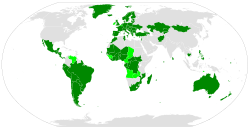Optional Protocol to the Convention Against Torture
| Optional Protocol to the Convention Against Torture and Other Cruel, Inhuman or Degrading Treatment or Punishment | |
|---|---|
 Ratified or acceded
Signed but not ratified
Non-parties | |
| Type | Human rights convention |
| Drafted | 18 December 2002[1] |
| Signed | 18 December 2002 |
| Location | New York |
| Effective | 22 June 2006[1] |
| Condition | 20 ratifications[2] |
| Signatories | 76[1] |
| Parties | 92[1] |
| Depositary | UN Secretary-General[3] |
| Languages | Arabic, Chinese, English, French, Russian and Spanish[4] |
The Optional Protocol to the Convention Against Torture and Other Cruel, Inhuman or Degrading Treatment or Punishment (commonly known as the Optional Protocol to the Convention Against Torture (OPCAT)) is a treaty that supplements to the 1984 United Nations Convention Against Torture. It establishes an international inspection system for places of detention modeled on the system that has existed in Europe since 1987 (the Committee for the Prevention of Torture).
The OPCAT was adopted by the United Nations General Assembly in New York on 18 December 2002,[1] and it entered into force on 22 June 2006.[1] As of March 2023, the Protocol has 76 signatories and 92 parties.[1]
History
The idea for this scheme of torture prevention goes back to the Swiss Committee for the Prevention of Torture (today
After ratification by 20 states, the Optional Protocol came into force on 22 June 2006.[1]
Ratification status
As of March 2023[update], 90 states have ratified the protocol: Afghanistan, Albania, Argentina, Armenia, Australia, Austria, Azerbaijan, Belize, Benin, Bolivia, Bosnia and Herzegovina, Brazil, Bulgaria, Burkina Faso, Burundi, Cabo Verde, Cambodia, Central African Republic, Chile, Costa Rica, Côte d'Ivoire, Croatia, Cyprus, Czech Republic, Democratic Republic of the Congo, Denmark, Ecuador, Estonia, Finland, France, Gabon, Georgia, Germany, Ghana, Greece, Guatemala, Honduras, Hungary, Iceland, Italy, Kazakhstan, Kyrgyzstan, Latvia, Lebanon, Liberia, Liechtenstein, Lithuania, Luxembourg, Madagascar, Maldives, Mali, Malta, Mauritania, Mauritius, Mexico, Mongolia, Montenegro, Morocco, Mozambique, Nauru, Netherlands, New Zealand, Nicaragua, Niger, Nigeria, North Macedonia, Norway, Panama, Paraguay, Peru, Philippines, Poland, Portugal, Republic of Moldova, Romania, Rwanda, Senegal, Serbia, Slovenia, South Africa, South Sudan, Spain, Sri Lanka, State of Palestine, Sweden, Switzerland, Togo, Tunisia, Türkiye, Ukraine, United Kingdom, and Uruguay.[1]
A further 13 states have signed but not ratified the protocol: Angola, Belgium, Cameroon, Chad, Republic of the Congo, Guinea, Guinea-Bissau, Ireland, Sierra Leone, Slovakia, Timor-Leste, Venezuela, and Zambia.[1]
See also
- Istanbul Protocol
- International Rehabilitation Council for Torture Victims
- Center for Victims of Torture
References
- ^ a b c d e f g h i j "Parties to the Optional Protocol to the Convention against Torture and Other Cruel, Inhuman or Degrading Treatment or Punishment". United Nations Treaty Collection. Retrieved 25 August 2023.
- ^ OPCAT Archived 2008-05-05 at the Wayback Machine, Article 28. Retrieved on 30 December 2008.
- ^ OPCAT Archived 2008-05-05 at the Wayback Machine, Article 27. Retrieved on 30 December 2008.
- ^ OPCAT Archived 2008-05-05 at the Wayback Machine, Article 37. Retrieved on 30 December 2008.
External links
- Text of the protocol — Office of the United Nations High Commissioner for Human Rights
- List of parties
- Association for the Prevention of Torture
- The Center for Victims of Torture
